When to Adopt a Chinchilla Rabbit: What You Need to Know
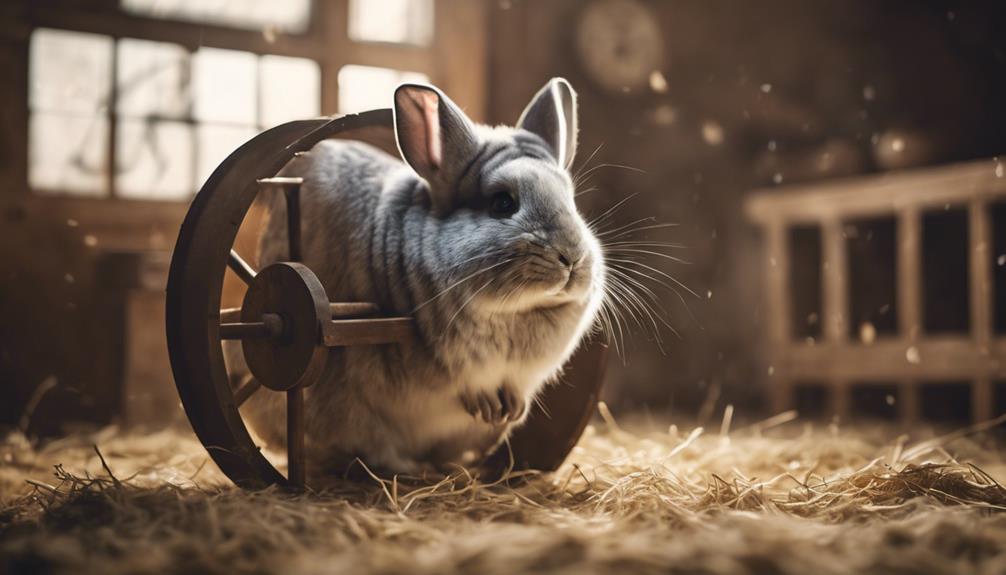
Chinchilla rabbits are a popular choice for adoption due to their friendly nature and low maintenance requirements. These small rabbits are known for their soft fur and playful personalities, making them an ideal pet for families and individuals alike.
When considering adopting a chinchilla rabbit, it's essential to provide them with a spacious cage or hutch to ensure they have enough room to move around and exercise. Chinchilla rabbits also require a balanced diet of hay, fresh vegetables, and pellets to stay healthy and happy.
Regular grooming is essential for chinchilla rabbits to keep their fur clean and prevent matting. Additionally, chinchilla rabbits are social animals and thrive on interaction with their owners, so be sure to spend time playing and bonding with your new pet.
Overall, adopting a chinchilla rabbit can be a rewarding experience for both you and your new furry friend. By providing proper care, attention, and love, you can enjoy many happy years together.
Chinchilla Rabbit Adoption Considerations
When considering adopting a Chinchilla rabbit, prospective owners should carefully evaluate their commitment to regular grooming and the unique care requirements associated with this charming breed. Chinchilla rabbits are a delightful pet option for those seeking a friendly and docile companion. Their beautiful coat, which resembles the color and fur texture of a chinchilla, adds to their appeal. Known for their agouti coat pattern consisting of black, white, and gray hairs, these rabbits stand out in terms of their appearance.
Potential pet owners should be aware that Chinchilla rabbits require regular grooming to maintain their dense coat and prevent matting. This aspect of care is essential for the overall health and well-being of the rabbit. Additionally, their friendly and sociable nature makes them great pets for families looking to welcome a new furry member. Before deciding to adopt a Chinchilla rabbit, individuals should consider these factors to ensure they can provide the necessary care and attention this breed requires.
Chinchilla Rabbit Care Requirements
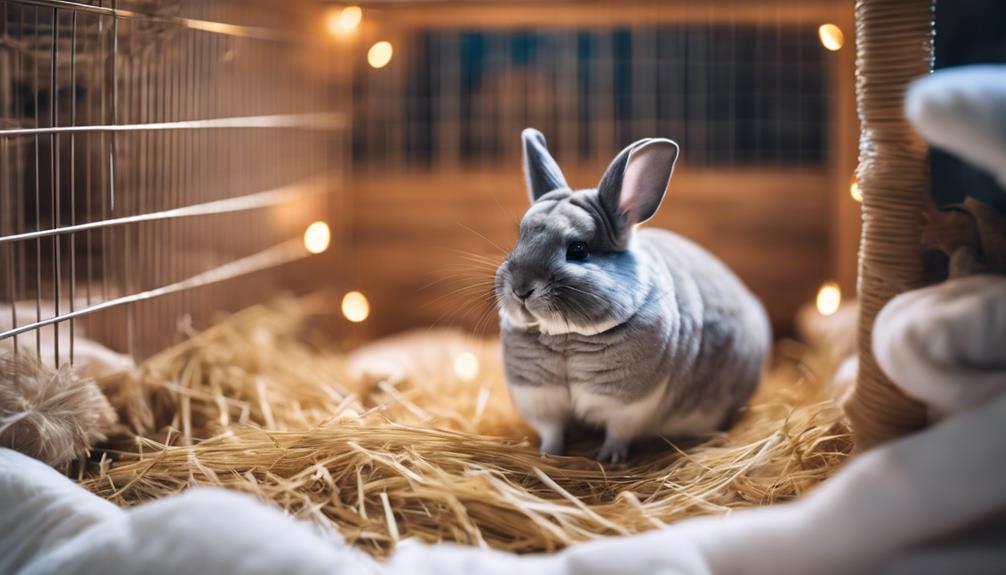
Considering the unique care requirements associated with Chinchilla rabbits, prospective owners must be prepared to provide a high-fiber diet, a secure living environment, regular grooming, social companionship, and proper veterinary care to ensure the well-being of these charming pets.
To meet the needs of a Chinchilla rabbit, owners should:
- Grass Hay: Chinchilla rabbits require a diet high in fiber, with grass hay being a crucial component. Timothy hay is an excellent choice to help maintain their digestive health and keep their teeth worn down.
- Secure Living Environment: Chinchilla rabbits thrive in a secure and spacious environment with platforms for climbing and exploring. Ensure their living space is escape-proof and free from hazards to prevent accidents.
- Regular Grooming: Chinchilla rabbits need regular grooming to keep their dense fur clean and prevent matting. Providing them with dust baths a few times a week helps keep their fur in top condition and prevents skin issues.
Chinchilla Rabbit Unique Characteristics

Chinchilla rabbits boast a distinctive coat color variation that mimics the chinchilla's fur, creating a visually appealing aesthetic.
Their gentle and docile temperament sets them apart as ideal companions for families and individuals seeking a friendly pet.
Understanding these unique characteristics can help potential owners make an informed decision when considering adopting a Chinchilla rabbit.
Coat Color Variations
The distinctive coat color variations of chinchilla rabbits contribute significantly to their overall charm and desirability as pets among rabbit enthusiasts. These unique characteristics include:
- Chinchilla-Like Appearance: Chinchilla rabbits boast a coat color pattern that mirrors the fur of their namesake, with a blend of pearl, dark blue, and dove gray hues.
- Luxurious Fur: Their soft and dense fur, reminiscent of chinchillas, adds to their allure, making them delightful to touch and cuddle.
- Striking Elegance: The coat color variations in chinchilla rabbits create a striking and elegant look, making them a highly sought-after pet choice among those seeking a visually appealing companion.
Temperament and Behavior
With their playful demeanor and unique vocalizations, chinchilla rabbits exhibit a captivating blend of curiosity and communication in their crepuscular lifestyle. Chinchillas are known for their agility and curiosity, constantly exploring their surroundings. They use a variety of vocalizations like chirps, barks, and purring sounds to express themselves.
Being crepuscular animals, they're most active during dawn and dusk, displaying high energy levels during these times. Chinchillas are meticulous groomers, ensuring their dense fur stays clean and mat-free by taking dust baths. In terms of social behavior, they enjoy grooming each other, engaging in playful activities, and huddling together for warmth and comfort.
Understanding these unique temperamental traits is crucial for anyone considering adopting a chinchilla rabbit.
Chinchilla Rabbit Health and Nutrition
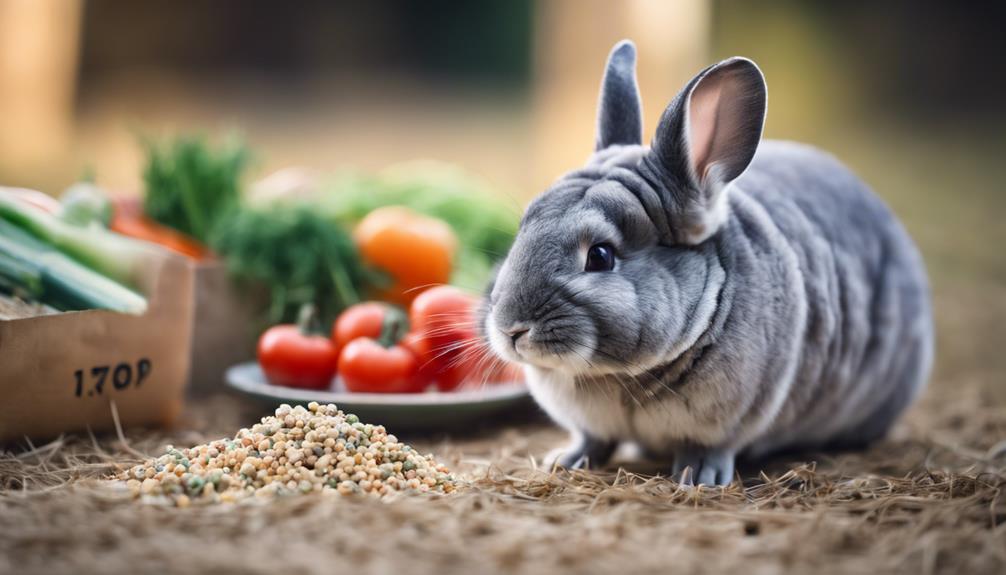
A high-fiber diet is crucial for maintaining the digestive health of chinchilla rabbits. These adorable creatures require specific care to ensure they lead healthy and happy lives. Here are some essential points to consider regarding chinchilla rabbit health and nutrition:
- Timothy Hay: Timothy hay is a staple in a chinchilla rabbit's diet. It provides the necessary fiber to keep their digestive system functioning properly.
- Fresh Water: Chinchilla rabbits must have access to fresh water at all times. Hydration is key to their overall well-being.
- Avoid Fatty and Sugary Foods: Foods high in fats or sugars can be harmful to chinchilla rabbits. It's important to stick to a diet that supports their health and doesn't cause digestive issues.
Chinchilla Rabbit Habitat Setup
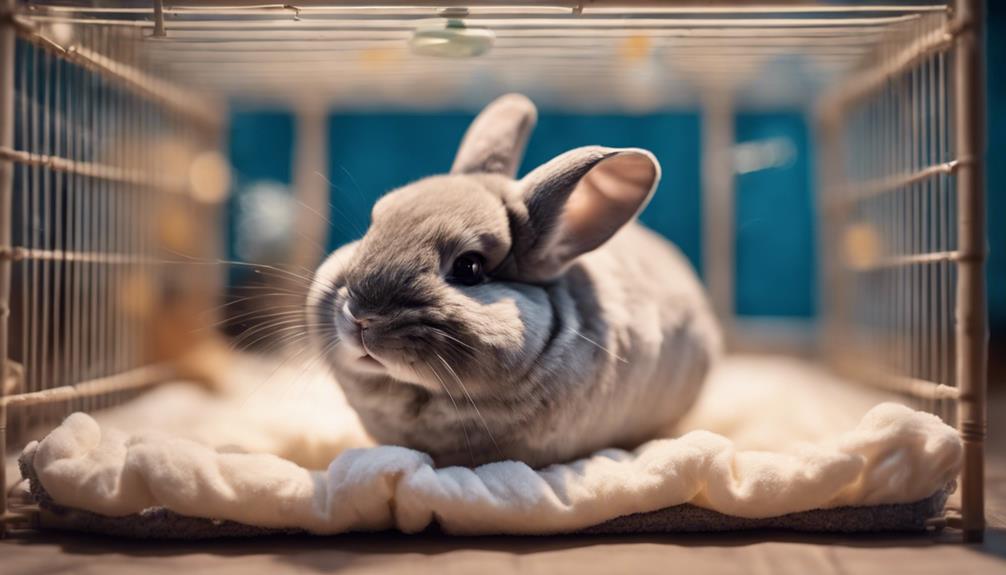
Chinchilla rabbit habitats should be spacious, with a minimum size of 4 x 4 x 3 feet to cater to their active nature. Providing vertical space and platforms for climbing is crucial for their well-being.
Regularly changing toys and maintaining a clean, dry environment with suitable bedding are essential for chinchilla rabbits' mental stimulation and health.
Cage Size Tips
For ensuring the well-being and happiness of a chinchilla rabbit, it's essential to provide a spacious cage that measures at least 4 x 4 x 3 feet to allow ample room for movement and exercise. When setting up the habitat for a chinchilla rabbit, consider the following tips:
- Vertical Space: Incorporate platforms and levels in the cage to cater to the chinchilla rabbit's natural jumping and climbing behaviors.
- Enrichment Opportunities: Regularly change and add new toys to prevent boredom and promote physical activity, satisfying the chinchilla rabbit's need for mental stimulation.
- Exploration and Stimulation: Providing a cage with enough space and interesting features allows the chinchilla rabbit to explore, play, and stay active, contributing to its overall well-being and contentment.
Bedding and Nesting
In setting up the habitat for a chinchilla rabbit, it's crucial to select soft bedding materials like natural aspen shavings or paper-based bedding to ensure a comfortable nesting environment. Chinchillas require a cozy and safe space to rest, making a nesting box filled with appropriate bedding material essential.
Avoid cedar or pine shavings, as they can harm chinchillas' respiratory systems. Chinchillas may burrow and nest in their bedding, so providing enough depth is important to accommodate their natural behaviors. Regularly checking and changing the bedding is necessary to maintain cleanliness and hygiene in the chinchilla's habitat.
Enrichment Activities
To enhance the well-being of a chinchilla rabbit in its habitat, incorporating a variety of enrichment activities is essential for promoting physical and mental stimulation. Here are three key enrichment activities for your chinchilla rabbit's habitat setup:
- Multi-level Cage Setup: Provide platforms and shelves for climbing and exploring, giving your chinchilla rabbit opportunities to exercise and satisfy their natural curiosity.
- Hideaways and Tunnels: Including these in the habitat creates a sense of security and offers enrichment by allowing your chinchilla rabbit to engage in hide-and-seek behaviors.
- Chew Toys: Offer safe chew toys made of appropriate materials to satisfy their gnawing instinct, promote dental health, and prevent boredom. Rotate and introduce new toys regularly to keep your chinchilla rabbit mentally engaged and entertained.
Chinchilla Rabbit Socialization Tips
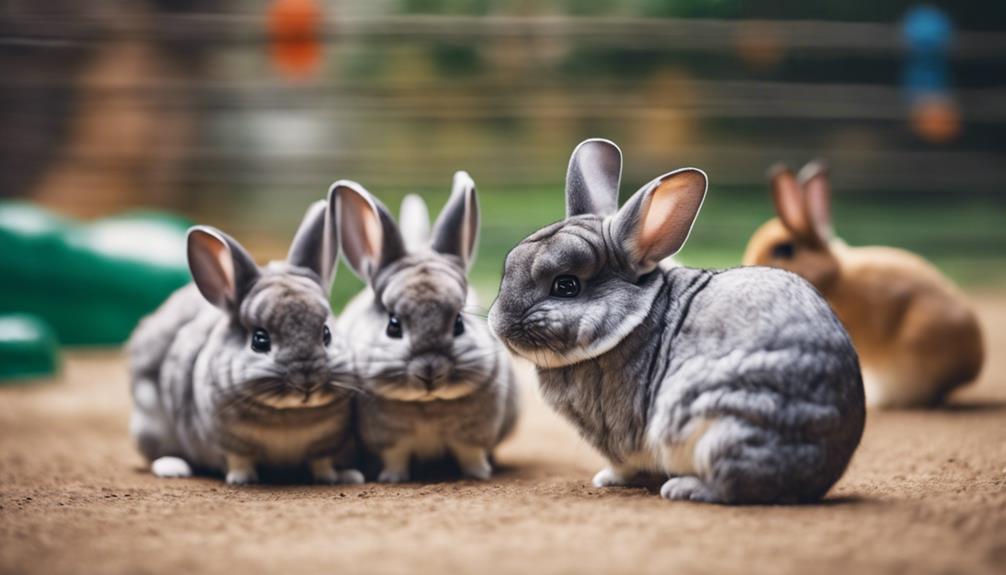
Chinchilla rabbits can develop strong social bonds when introduced to compatible companions gradually. It's recommended to adopt at least two chinchilla rabbits to meet their social needs and prevent loneliness. When socializing chinchilla rabbits, it's important to allow them time to bond and establish hierarchy, as they thrive on companionship.
Providing a spacious and enriching environment can encourage healthy social interactions among chinchilla rabbits. This includes having hiding spots, tunnels, and toys for them to explore together. Regular supervised playtime and interaction with chinchilla rabbits can also strengthen their bond with their owners.
It's crucial to monitor their interactions initially to ensure they get along well and to intervene if any signs of aggression or dominance issues arise. By following these socialization tips, chinchilla rabbits can lead happy and fulfilling lives in the company of their rabbit companions.
Chinchilla Rabbit Adoption Sources
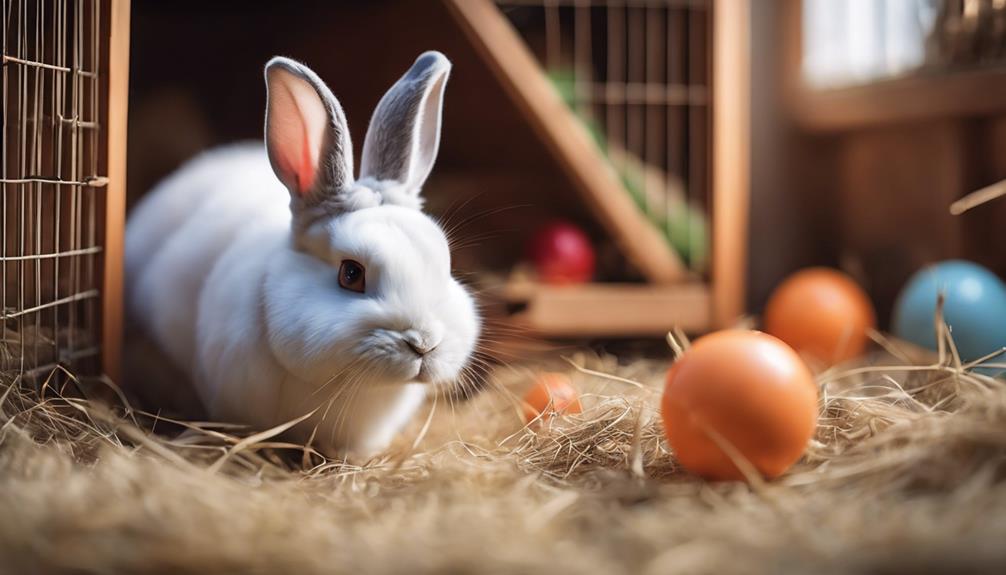
Considering the importance of sourcing chinchilla rabbits from reputable sources, potential adopters can explore shelters, rescues, or specialized breeders for this unique breed. When looking to adopt a chinchilla rabbit, it's crucial to choose a source that prioritizes the well-being and health of the animals.
Here are some options to consider:
- Shelters: Shelters often have chinchilla rabbits available for adoption due to various reasons such as owner surrender or strays. Adopting from a shelter not only gives a rabbit a second chance at a loving home but also helps reduce the population of animals in need.
- Rescues: Animal rescues specializing in rabbits may also have chinchilla rabbits looking for forever homes. These organizations work tirelessly to ensure the animals in their care are healthy and well-socialized before adoption.
- Specialized Breeders: Breeders focusing on chinchilla rabbits can provide detailed information about the breed's care and specific needs. They can offer guidance on proper diet, housing, and overall well-being of chinchilla rabbits. Adopting from a reputable breeder can help ensure you're well-prepared to care for your new pet.
Frequently Asked Questions
What Should I Know Before Getting a Chinchilla?
Before getting a chinchilla, one should know about proper chinchilla care and housing options. Understanding their unique dietary needs and social nature is crucial. It's important to research and prepare to ensure a happy and healthy life for these adorable pets.
What to Do When You First Get a Chinchilla?
When first getting a chinchilla, focus on cage setup with platforms and toys for climbing. Provide daily fresh hay, pellets, and water. Offer a dust bath for grooming. Monitor behavior closely to ensure a smooth adjustment.
What Is the Best Age to Get a Chinchilla?
The best age to adopt a chinchilla is around 12 weeks old. Young chinchillas are easier to bond with and train. Consider the chinchilla lifespan and care requirements when choosing an age that fits your commitment level and lifestyle.
Are Chinchillas Good Pets for Beginners?
Chinchillas can be tricky for beginners due to their specific care needs and sensitivity. Understanding chinchilla behavior and providing a suitable environment and diet are vital. Beginners must research extensively and commit long-term.









